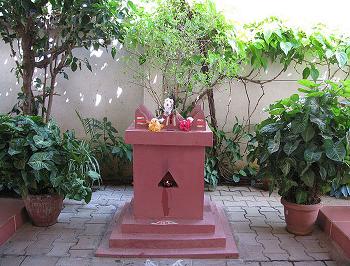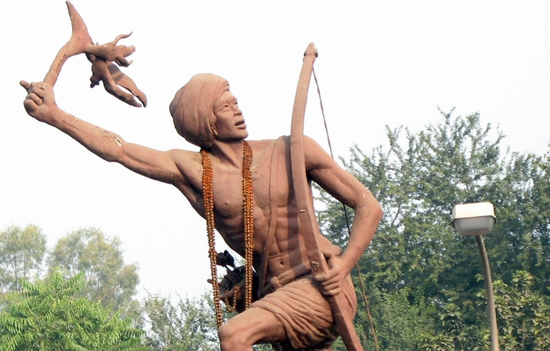- An introduction into the life of Bhagwan Birsa Munda and his transformation from an ordinary being into a spiritually evolved one and freedom fighter.
One of the key aspects of Bhagwan Birsa Munda’s life was his ability to evolve into different avatars and impact people’s lives positively.
In 1890, Birsa Munda left his village and wandered across the region. In due course, he came across a Brahmin scholar and healer Anand Pandey. Birsa was very impressed by Pandey’s knowledge and spent a couple of years imbibing gyaan from him. It is said that Anand Pandey used anecdotes from
Ramayana and Mahabharat in his teachings. This opened up a new world for Birsa
and he assimilated these teachings with great sincerity.
In 1894, when
Birsa re-entered his village, villagers were very surprised to see him in an
enlightened avatar. He would speak less and spend a lot of time in isolation,
meditating. Soon, Birsa would preach reformist practises to the villagers and
within months, his impact and influence grew by leaps and bounds, making the
Britishers nervous of his blind following.
This excerpt from the authors and Ankita Verma’s book, The Legend of Birsa Munda, narrates the story of Birsa’s transformation.
Chalkad
1894
‘There is only one God. He is the creator of the universe, an all-powerful nurturer and destroyer who can ensure the welfare of every human being. It is better to worship Singabonga alone than to pray to several gods and goddesses.’
Birsa sat in front of a large group of people who had assembled for that day’s morning discourse, and spoke to them at length about how superstitions and archaic beliefs and practices were unnecessarily complicating their lives and keeping them away from a true and more meaningful form of faith.
As his fame as a
healer spread through the villages in the region, Birsa started to share more
and more of what he knew and believed in with the people who came to see him.
His teachings were uncomplicated and they were aimed at making the lives of his
people simpler, yet empowered. He wanted them to shed the extra baggage of
borrowed cultural obligations that they had acquired from the missionaries and
the zamindars who literally ruled over them.
‘The concept of the supernatural is all but a figment of contrived human imagination. Shun it.’
‘God should be worshipped with small quantities of rice and other grains. Bigger sacrifices are not required,’ Birsa told the people, breaking down the idea further and patiently explaining it when some members of the audience looked at him askance. His words were too reformist for the people, too radical for them to stomach in one go. But just as Anand Pandey had taken the time to explain things to him and patiently make him understand everything the best he could, so did Birsa take the time to be patient and gentle in teaching his people.
 Tulsi Plant.
Tulsi Plant.
He stressed on
the importance of such things as the worship of the tulsi plant in every household,
people giving up the consumption of liquor and wearing the sacred thread and maintaining
simple habits of good personal hygiene and moral goodness.
He borrowed heavily
from the Gita, Ramayana and Mahabharata, once again upholding the teachings of his
Pandit Baba in wanting to urge his people onto the path of spiritual growth.
Birsa’s teachings and his particular brand of spiritualism began to be referred to as BIRSAIT. The new religion believed in one God and encouraged the people to revert to their ancestral faith. People thronged to Chalkad to get a glimpse of Birsa, to hear him speak, and the cult around him grew bigger with each passing day. Many who saw him even claimed that he was an avatar of Lord Krishna, and one day, when the gathering was particularly large and enthused, in a spur-of-the-moment decision, Birsa stood up and announced that henceforth, he would be known as Dharti Aba or Father of the Universe.
 Bhagwan Birsa Munda.
Bhagwan Birsa Munda.
All this while, even as word about Birsa and his miraculous powers spread like wildfire, the Munda Sardars had been carrying on with their movement against the British without much success and with a fast-shrinking support base. Their strikes against the angrez sarkar were sporadic and unorganised, making them largely ineffective. But now, when they suddenly sensed an exploitable opportunity in Birsa’s growing clout and popularity, a handful of them-Chalkad’s Soi Munda, Kasmar’s Jaun Munda, Narang’s Martin Munda, and Kilo’s Manga Munda—decided to offer him their full support.
‘You are all senior to me and I am grateful for your support,’ Birsa thanked them as they all sat chatting under a banyan tree near his home in Chalkad. ‘But what can I do for you?’ he asked, for he knew that there had to be a catch to this offer for help and support. He was right.
‘Well, we want you to convert your social movement into a more focused political movement against the British,’ Soi Munda explained.
Birsa stared at the men. He wasn’t unaware of either the political ramifications of his movement or the extent of his own influence over the people. However, he was a little hesitant to commit himself fully to the Sardars’ bidding.
‘A complete social reformation of our people is a basic prerequisite before they can undertake a larger battle,’ he said finally.
‘Our movements may have slightly different purposes, Birsa, but both have a common end goal: the upliftment of the Munda samaj,’ So Munda reasoned with him. ‘And trust me, our actions are actually interlinked because our enemies are common.
Neither you nor we can achieve our purposes without getting together, without combining forces,’ Martin Munda added.
That night, after the Sardars left, Birsa had a long chat with Komta, explaining his vision for the community, his aspirations and plans. ‘Maybe the time has come to turn this into a mass movement,’ Birsa declared before retiring for the night.
In the days that
followed, as Birsa prepared himself to take the next big step and give his movement
a more coherent political focus, there were two people in Chalkad who were feeling
the heat of this brewing rebellion: Zamindar Tribhuvan Singh and Father
Hoffman.
While any form of tribal empowerment meant bad news for the zamindars, Father Hoffman, who had moved from Bamba to Chalkad a few years ago, saw his influence over the tribals waning right in front of his eyes. Not only had Birsa challenged his authority on multiple occasions back when they had both been in Bamba, but now, with his Birsait inspiring more and more of the tribals to abandon Christianity and convert right back to their primitive faith, things had started to look more than a little grim. Needless to say, both Father Hoffman and Tribhuvan Singh started lobbying for the British administration to intervene and destroy Birsa’s growing sway.
Author
Tuhin Sinha is an author and content strategist.
To
buy book authors books online
1. The Legend
of Birsa Munda
2. The
Great Tribal Warriors
3. Mission
Shengzhan: India Fights the Dragon